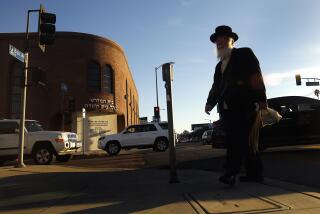Congregations Cast ‘Sins’ in Ancient Rite
- Share via
Amid tossed bread crumbs and squawking waterfowl, more than 200 people from four local synagogues gathered at the Westlake Village Marina on Sunday morning to take part in an old but lesser-known Jewish tradition.
Called Tashlikh--the Hebrew word meaning to cast off--the ceremony calls for Jews to gather by water, pull out an object symbolic of their sins and cast it into the depths as a sign of forgiveness and a new beginning.
For the those who gathered from Temple Aliyah in Woodland Hills, Calabasas Shul and Temple Solael and Shomrei Torah, both of West Hills, handfuls of bread crumbs doubled as sins--much to the joy of a noisy group of geese and ducks.
The congregations include reform, conservative and Orthodox Jews. Members said the ceremony along the marina landing was another way to accentuate their similarities, while renewing age-old traditions often overshadowed in the modern world.
“It’s bringing us together, which isn’t always easy,” said Traci Hamer, a member of the Calabasas Shul, who attended with her husband and daughter. “It’s very important to know these customs. It’s all about education.”
Rabbi Tsafi Lev of Temple Aliyah concurred. After a similar ceremony drew 20 people to the marina last year, he got together with the other rabbis to organize this weekend’s Tashlikh and was surprised by the tenfold improvement in turnout.
“It shows the power of folk customs for bringing people together,” Lev said. “I was blown away.”
The Tashlikh ceremony was born in the Middle Ages and is based on a verse from the biblical book of the prophet Micah, which says, “And You [God] shall throw their sins into the depths of the sea.”
It is traditionally held near a flowing body of water one or two days after Rosh Hashana, which together with Yom Kippur, make up the Jewish High Holy Days.
Rosh Hashana, celebrated Sept. 10 and 11 this year, marks the Jewish New Year. Yom Kippur, which began Sunday at dusk and concludes today at sundown, is observed with prayer, fasting and atonement.
In the case of Tashlikh, not everyone lives close enough to a body of water to get there, the rabbis said. In fact, they noted, a Tashlikh ceremony held any time between Rosh Hashana and Yom Kippur is acceptable.
Gary Pulver of Woodland Hills, who attended with his family, said he had heard of the ceremony but had never taken part.
The setting--the outdoors and the scenic, man-made lake--provided a poignant symbol for children who are just beginning to have such religious traditions passed down to them. “This gets the kids more into the holidays. It’s really a nice tradition.”
But Lev, said the ceremony was also good for adults in a world that never seems to slow down.
“We work so hard to put bread on the table,” Lev said. “People are discovering that traditional ways offer simplicity and peace of mind.”
More to Read
Sign up for Essential California
The most important California stories and recommendations in your inbox every morning.
You may occasionally receive promotional content from the Los Angeles Times.













